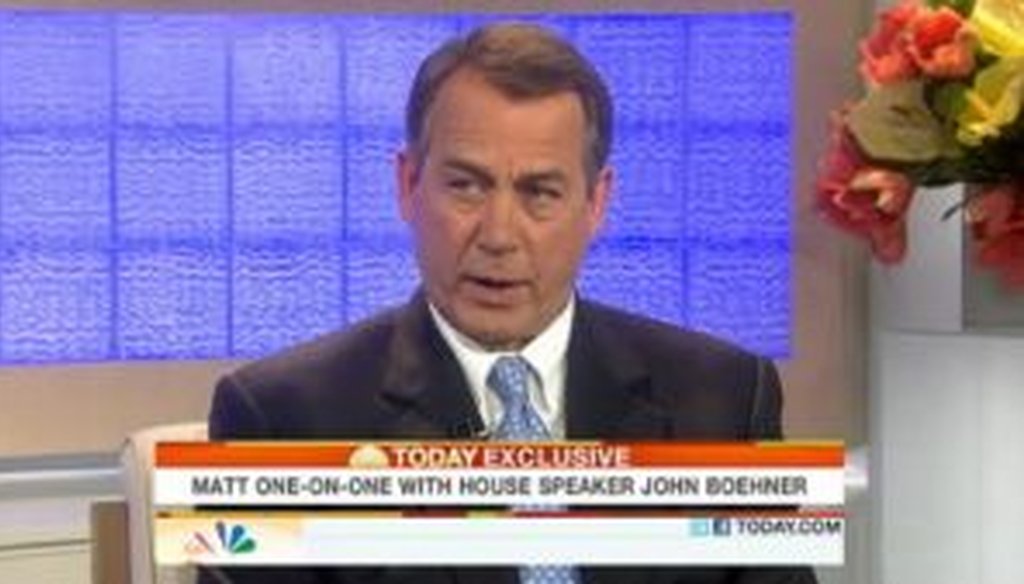Get PolitiFact in your inbox.

House Speaker John Boehner, R-Ohio, appeared on NBC's Today show on May 10, 2011. We checked his facts on job creation.
John Boehner says Bush tax cuts created 8 million jobs over 10 years
During an interview on NBC’s Today show, House Speaker John Boehner, R-Ohio, offered some job-creation statistics to cast a favorable light on the tax cuts passed under President George W. Bush in 2001 and 2003.
Host Matt Lauer said to Boehner, "You talk about creating jobs. When the Bush era tax cuts were passed in 2001, unemployment in this country was 4.5 percent. Today it's at 9 percent, just down from 10 percent. So why are the Bush era tax cuts creating jobs?"
Boehner responded that the tax cuts "created about 8 million jobs over the first 10 years that they were in existence. We've lost about 5 million of those jobs during this recession."
Several readers suggested that we check Boehner’s statistics. So we did.
Boehner's statement actually has several problems. One is the question of whether the tax cuts actually caused the job growth; more on that later. First, we’ll point out something more basic -- that Boehner’s chronology is off.
The first of the tax cuts was passed in June 2001, so we haven’t hit a full 10 years since the first cut was enacted, and we’re only about eight years past the enactment of the second round of cuts. We’ll give Boehner the most generous parameters possible -- from the signing of the first tax cut in June 2001 until the pre-recession employment peak, which came in January 2008. (When we contacted Boehner’s office, they confirmed that this is the comparison he had in mind.)
We turned to data from the Bureau of Labor Statistics -- specifically, figures from the Current Employment Statistics series, which is calculated using a broad survey of employer payroll data. Here are the numbers:
June 2001: 132,047,000 people employed
January 2008: 137,996,000 people employed
Increase during that six-and-a-half-year period: 5,949,000 people
That’s roughly 6 million jobs -- significantly below the 8 million Boehner cited.
Now let’s turn to the jobs lost during the recession. We once again calculated the numbers in the way most favorable to Boehner -- from the peak of employment (January 2008) to the lowest point (February 2010). Here are the figures:
January 2008: 137,996,000 people employed
February 2010: 129,246,000 people employed
Decrease during the roughly two-year period: 8,750,000 people
That’s almost 9 million jobs lost -- almost twice what Boehner had said on Today.
What’s going on?
When we reached Boehner’s office, spokesman Michael Steel provided a different set of numbers -- numbers that we determined were from a different set of BLS statistics, known as the Current Population Survey.
The numbers from the CPS data are produced by a smaller survey of individuals and families. They are best known for producing the widely tracked national unemployment rate, but the data also include an estimate of the raw number of employed Americans, which is what Boehner used.
Here are the CPS figures for the same periods we looked at above:
June 2001: 136,873,000 people employed
January 2008: 146,407,000 people employed
Increase over about six and a half years: 9,534,000 people
January 2008: 146,407,000 people employed
February 2010: 138,698,000 people employed
Decrease over about two years: 7,709,000 people
So using the CPS figures, Boehner actually underestimated the jobs created after the passage of the Bush tax cuts, rather than overestimating them. And his number of jobs lost in the recession was closer to the CPS number than to the CES number.
In other words, using one set of data, Boehner’s way off, and using another set, he’s closer. What gives?
For the periods studied, the two data sets’ varying methodologies appear to have produced large differences in the number of jobs created and lost. While both statistics have their advantages and disadvantages, the CES numbers are "usually preferred when talking about job growth or loss," said Stacey Standish, a BLS spokeswoman.
And there’s this problem: What if we had used Boehner's 10 year figure rather than the six-and-a-half-year upswing of jobs? Over the full 10 years, employment has actually fallen by more than 1 million jobs using CES numbers and risen by 2.8 million according to the CPS figures. Either way, both figures are well below the job gains Boehner touted for the full 10-year period.
Meanwhile, there are other concerns beyond the statistics. While J.D. Foster, a senior fellow at the conservative Heritage Foundation, said he feels both CES and CPS are valid measures, he wondered whether Boehner had oversold cause and effect. "The real issue is the statement that the Bush tax cuts ‘created’ these jobs," Foster said. "Would the economy have created no jobs during this period but for the tax cuts?"
And Gary Burtless, a labor economist with the centrist-to-liberal Brookings Institution, argues that "the more basic point is that under either measure of employment gain, the proportional rise in employment in the Bush Administration after passage of his initial tax cut was comparatively small."
Burtless put together a comparison of recent two-term presidential administrations’ job growth over the equivalent period -- the 81 months starting in the June after the president’s inauguration. George W. Bush produced smaller job gains than most recent administrations regardless of which employment measure is used.
Employment under Bush grew by 4.5 percent using CES and 7 percent using CPS, whereas employment grew by double digits under presidents Bill Clinton and Ronald Reagan, and also under the combined eight-year administrations of Richard Nixon and Gerald Ford, who finished Nixon's term after he resigned, and John F. Kennedy and Lyndon B. Johnson. Only under Eisenhower was job growth more sluggish than it was under George W. Bush, and even then, it was only the case using one of the two BLS statistics. (Burtless did not compare job growth during the administrations of George H.W. Bush or Jimmy Carter because they served only one term each.)
Where does all this leave us? First, under the most common yardstick for measuring employment -- the CES data -- Boehner's claim is significantly overstated. Second, while Boehner is closer when using a different statistic, it’s only more accurate if he uses a time period much different than the one he stated in the interview. And third, his suggestion that the tax cuts are primarily responsible for subsequent job growth is contentious at best (and the job growth he points to is modest compared to previous administrations).
So the numbers Boehner offers are accurate only with significant adjustments. Overall, we find his statement too flawed to give it a rating higher than False.
Our Sources
John Boehner, comments on NBC’s Today show, May 10, 2011 (transcript via CQ -- subscribers only)
Bureau of Labor Statistics, "Labor Force Statistics from the Current Population Survey" (main index page), accessed May 10, 2011
Bureau of Labor Statistics, "Employment, Hours, and Earnings from the Current Employment Statistics survey (National)" (main index page), accessed May 10, 2011
E-mail interview with Gary Burtless, senior fellow with the Brookings Institution, May 10, 2011
E-mail interview with J.D. Foster, senior fellow at the Heritage Foundation, May 10, 2011
E-mail interview with Stacey Standish, spokeswoman for the Bureau of Labor Statistics, May 10, 2011
E-mail interview with Michael Steel, spokesman for House Speaker John Boehner, May 10, 2011
Browse the Truth-O-Meter
More by Louis Jacobson
John Boehner says Bush tax cuts created 8 million jobs over 10 years
Support independent fact-checking.
Become a member!
In a world of wild talk and fake news, help us stand up for the facts.








































